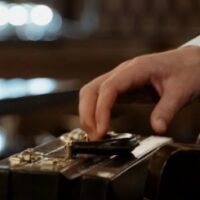Mr. Harding stared at the young man across the desk from him. He was certainly different than most of the young professionals that were applying for the associate position at the Exchange.
His hair was what Mr. Harding’s father would have called “high and tight,” his suit was pressed, his shoes were shined. That was enough to set him apart. Suits had fallen out of style, even at firms as storied at the Exchange, most young applicants interviewing in “business casual” or “fast casual” or whatever term disguised the latest trend for slobbery. Over the past two decades the venture capitalists had gained enough respect that their worst sartorial choices had bled over into other, more respectable, sectors. Not for this candidate, though, one Mr. Summers.
He was certainly more focused than the other applicants. He didn’t have the usual cloud of notification signals that surrounded other young people. Mr. Harding would often note when applicants would unconsciously reach for their smartphone, even the pressure of a job interview unable to dampen that Pavlovian response. It might have been that he didn’t bring his device with him, but there was something about this Summers that told Harding it was more than forethought.
Perhaps his age had something to do with it. For better or worse, Summers was older than most of the professionals that applied for associate positions at the Exchange. Leaning back in his chair, Harding picked up the single-sheet of paper that was meant to sum up Summers’ lifetime of professional experience.
The reading glasses Harding stared down his nose through brought the sheet’s writing into focus, but blurred everything else, which suited his purposes. “I see you joined the military in 2014.”
Mr. Summers bobbed his head and answered with a simple, “Yes, sir.”
“You were there for quite awhile, through the withdrawal, followed by an honorable discharge.” Harding made a show of flipping the paper over, inspecting the back, blank side. “There there’s a sizable gap in your resumé.”
“Yes.” Summers cleared his throat. “After leaving the service I…” He paused, long enough that Harding glanced over his spectacles. Seeing his attention, Summers replied with a steady, “I had difficulty adjusting to civilian life.”
“For three years?”
“No, sir. After a few months I was contacted by the Peachtree Group and offered a position there. I went back overseas for most of that time.”
“Your curriculum vitae doesn’t have that listed among your accomplishments.” Harding threw in a bit of Latin showmanship, smiling in the hopes of coaxing something of a human reaction out of Summers.
Summers remained immobile. “I don’t really think of it as an accomplishment.”
Harding stared quizzically at Summers. “The Peachtree Group does work for the Department of Defense, doesn’t it?”
“Yes, sir.”
“So in a sense you were still serving your country.”
There was another long pause from Summers before he answered. “I suppose you could say that.”
“So what did you do while employed there?”
Summers’ face became grim. Or grimmer. Harding couldn’t quite tell if that were possible. He looked Harding directly in the eyes, though, when he responded, “I’m not at liberty to discuss it.”
Harding had worked at the Exchange long enough to know secrets, the making and keeping of them, and found the young man’s reply to be irksome. “Excuse me?”
Summer’s eyes flicked to his shoes, as if the answer might lie there. Harding was certain there was something more of an explanation coming, something about state secrets, images of redacted documents fanning out in his mind. These spiraled into a small anecdote he would share at a cocktail party later, mentioning what an interesting fellow he had interviewed, a patriot and soldier that wasn’t really qualified for the job, but his service had clearly earned him an opportunity at the Exchange.
Instead, when Summers’ eyes came up they were that of a wounded animal, the steady discipline restraining a watery regret. He only repeated, “I’m not at liberty to discuss it.”
Surprised by the change in temperament, Harding whipped the resume in his hand, cracking the crisp paper. “The firm has business with the DOD as well. We’ve contracted with the Peachtree Group.”
At these words, Summer’s eyes returned to their stony discipline, resting on Harding. “If you know that, you must have classified status.”
Harding straightened in his chair, happy to let Summers know the type of man he was speaking with. “Of course I do. I’ve been working for the Exchange for three decades. My department handles international projects, particularly in the EMEA.”
“Then it was you who signed order GH-657.”
At the mention of this very specific corporate work order, Harding found his vision blurred for reasons completely unrelated to his reading glasses. His chest tighten. Images of the Sudan came into his mind. Not actual eye witness events, of course. He hadn’t been stupid enough to be in that savage place personally, but some of the worst atrocities had made the news. Focusing back on Summers again, he managed to get out, “How did you – ?”
“The order was to hire a group of local contractors to remove squatters from a survey area where cobalt had been discovered.” Summers paused. “Were you ever curious about how it was handled?”
“I didn’t – “
“You didn’t ask about the details.” A blink and the discipline in his eyes became a stoney emptiness. “Squatters is another word for ‘refugee camp.’ The contractors were a group of Janjaweed from Chad. They don’t much care for the local tribesfolk in the Sudan, so when they got the orders to remove the refugees they weren’t real concerned about how. I think maybe you know the rest.”
Harding stared at Summers, chest deflated and mouth agape. After a moment he managed, “What exactly did you do for the Peachtree Group, Mr. Summers?”
“I’m not at liberty to say,” Summers repeated, but then looked to the closed office door, almost as if X-ray vision allowed him to see the secretary beyond it. Before he could ask what he was doing, Harding was shocked by the swiftness of the younger man as he moved around the desk. “But I’d be happy to show you.”
Harding was almost able to call for help before Summers began his demonstration.
See the author’s published work here.
Related Posts
The American: Chapter 100 Next Post:
The American: The Trouble with Idiots (pt. 11)
























